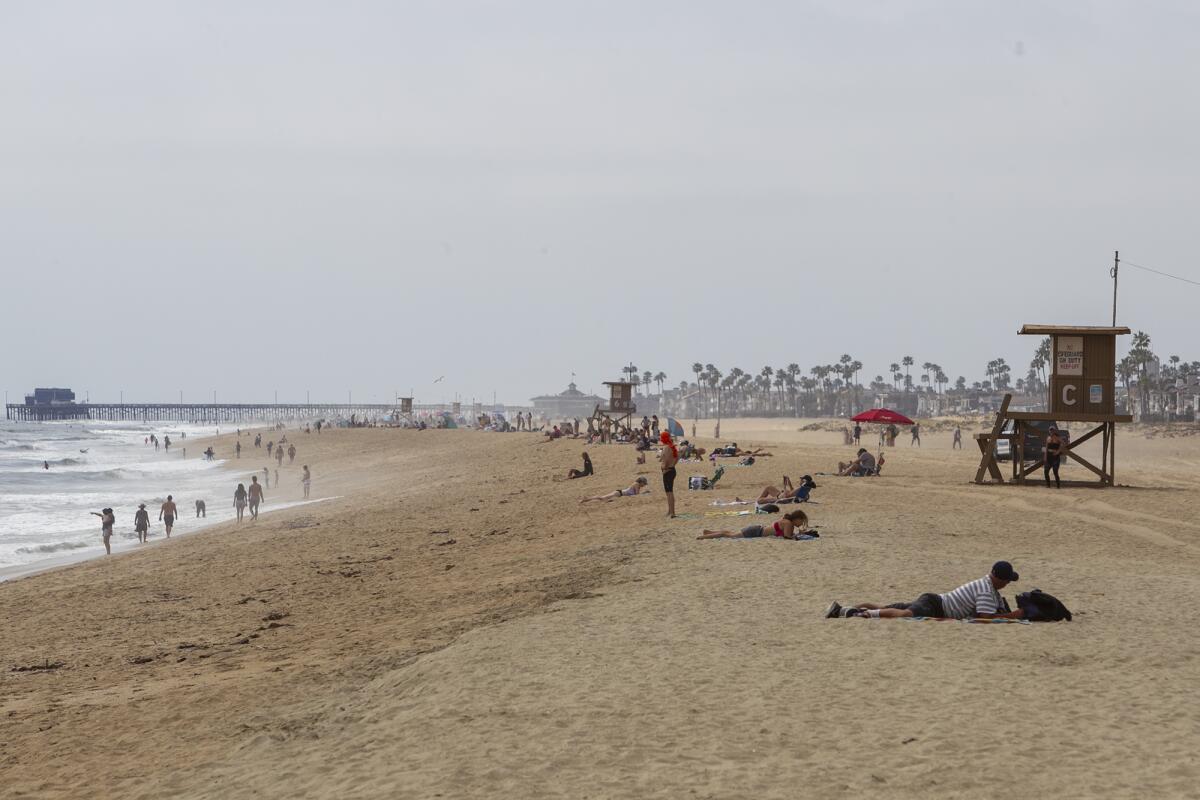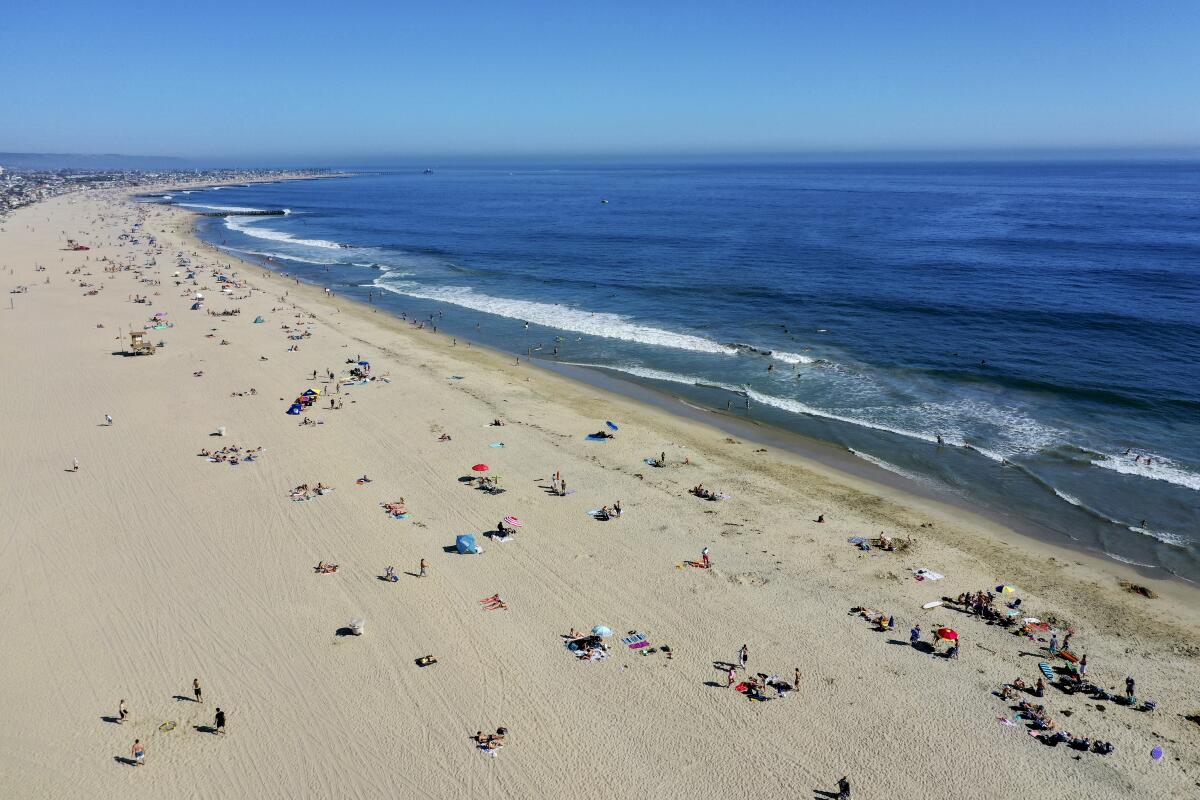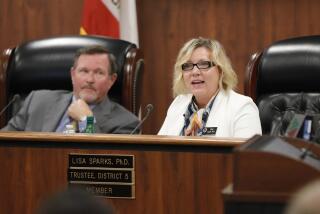Newport Beach city councilman personally sues Gov. Gavin Newsom over beach closure

- Share via
Newport Beach City Councilman Kevin Muldoon personally sued Gov. Gavin Newsom in federal court Monday over Newsom’s beach closures targeting Orange County.
Muldoon, a vocal proponent of lifting the weeks-long lockdown imposed to stem the coronavirus pandemic, filed the suit on his own behalf and was footing his own legal costs, he said. He called Newsom’s directive, handed down Thursday and put into effect the next day, unconstitutional.
Newsom’s order applies only toOrange County. A reopening date is unclear.
“Defendants have shown by their actions a willingness to ignore and to violate the fundamental civil rights of California residents,” the lawsuit reads. “Their actions ... are persistent and capable of repetition unless they are enjoined by this court.”
The suit also lists California Atty. Gen. Xavier Becerra, Governor’s Office of Emergency Services director Mark Ghilarducci and California Natural Resources Agency Secretary Wade Crowfoot as co-defendants. The suit seeks legal fees and an order blocking the closures.
Our oceans. Our public lands. Our future.
Get Boiling Point, our new newsletter exploring climate change and the environment.
You may occasionally receive promotional content from the Los Angeles Times.
Muldoon’s suit alleges he was denied his rights to travel, due process, equal protection, liberty and access navigable waters — even though Orange County has relatively low numbers of cases of COVID-19, the potentially fatal respiratory disease caused by the coronavirus, particularly compared to other coastal Southern California counties where some beaches are open and others closed.
A separate lawsuit was filed within hours of Newsom’s announcement by the cities of Huntington Beach and Dana Point and four Huntington and Newport businesses, Newport Beach did not join that case, filed in Orange County Superior Court, but the City Council, Muldoon included, voted Saturday to file a brief in support.
Muldoon’s own suit argues there is “no rational scientific basis for the beach closures,” citing studies on the virus’ behavior and disease statistics from regional public health departments.
“Since the initial outbreak of COVID-19 in the United States in February and March 2020, the federal government’s projections of the anticipated national death toll related to the virus has decreased substantially, by an order of magnitude,” the complaint reads. “Despite such revisions, defendants have increasingly restricted — where not outright banned — plaintiff’s engagement in constitutionally protected activities.”
Beaches have become a flash point in sweeping statewide stay-at-home orders handed down in mid-March. Starting in late March, Newport Beach officials closed several coastal destinations, including its piers, boardwalks and beach parking, but were hesitant to close the beach itself.
Then, on the weekend of April 24-26, a heat wave enticed lockdown-weary residents to beaches around Orange County, where most cities had left the sand accessible and the Board of Supervisors had just reopened county-run beaches. The turnout was well-documented. Widely circulated photos and videos of the shore in Newport Beach and Huntington Beach appeared to show dense throngs not practicing physical distancing or wearing face coverings.
Los Angeles County’s beaches remain closed. San Diego and Ventura counties, which had been closed until the same weekend, remain open with some restrictions.

Newport officials countered press images with their own taken by police from a helicopter during Saturday’s peak appearing to show much less dense crowds, and at Tuesday’s City Council meeting, lifeguards said Friday and Saturday drew about 40,000 people each day. By contrast, the Fourth of July draws between 100,000 and 130,000, they said.
According to the suit, studies show “that the closure of public beaches would not only be of no benefit to preventing the transmission of COVID-19 or death from it — it could actually be detrimental to such efforts.”
This cites a Chinese study of COVID-19 clusters in the city of Wuhan the outbreak’s epicenter, that concluded outdoor transmissions were few and rare and a U.S. Department of Homeland Security claim that sunlight and high temperatures could rapidly destroy a COVID-19 particle. It also suggests that being cooped up can harm physical and mental health.
Further, the Centers for Disease Control and Prevention’s official mitigation guidelines for COVID-19 make no mention of closing public parks or beaches, and World Health Organization and European CDC guidelines also advise against “internal travel restrictions” during a pandemic because they have little effect on reducing transmission, while imposing major social and economic costs.
Meanwhile, Huntington Beach faced an early setback Friday when a Superior Court judge denied its immediate request to block the closure. That case is set to return to court May 11 for another crack at lifting the restrictions.
More to Read
Sign up for Essential California
The most important California stories and recommendations in your inbox every morning.
You may occasionally receive promotional content from the Los Angeles Times.














